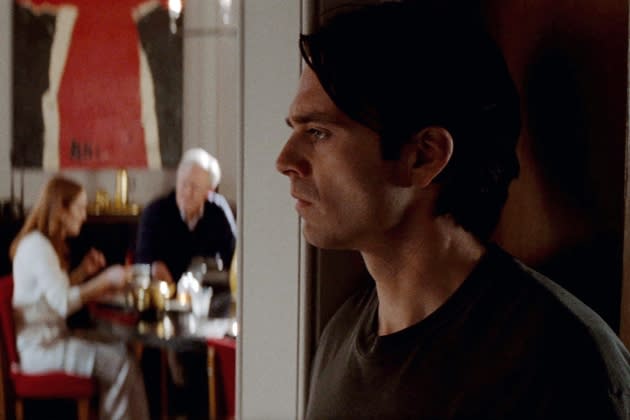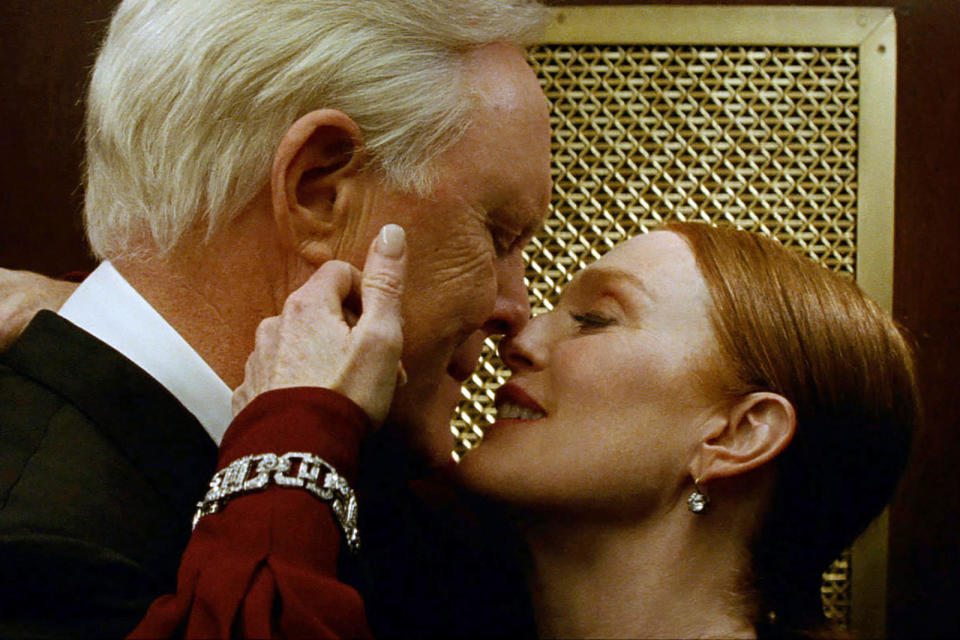‘Sharper,’ Apple TV+’s Con-Artist Caper, Is a Lot Less Sexy Than It Thinks It Is
- Oops!Something went wrong.Please try again later.

Benjamin Caron’s Sharper, Apple TV+’s sleek but unsatisfying new thriller, needed to be a little smarter to work. It’s more plain than titillating, more predictable than mysterious. But its opening stretch is pleasurably deceptive. Sandra (Briana Middleton) is a grad student at NYU who walks into a humble indie bookstore on the hunt for a copy of Zora Neale Hurston’s Their Eyes Were Watching God. Tom (Justice Smith), who owns the store, is a depressive bookworm who isn’t looking for love only because he seems to have given up on it. They strike up a conversation. A conversation becomes a date. A galvanizing montage-romance follows, the kind of easygoing tit for tat of shared life stories and made-for-each-other infatuation. You know Italian? Me too! You have a dead parent? Me too!
Their story doesn’t end the way it should, with the pair of them skipping off into the sunset clutching prized first editions of their favorite 19th-century novels and living happily ever after as library hermits. One of these people is lying to the other — a “sharper,” per the movie’s title, is a con artist. Either Tom or Sandra has fashioned a fake backstory for themselves, learned Italian, memorized famous quotes from the first pages of classic novels (“All happy families are alike…”) and altogether transformed themselves into the right kind of person to catch a particular kind of sap.
More from Rolling Stone
Woman Who Allegedly Scammed Holocaust Survivor Out of Millions Previously Posed as Psychic
2022 Was the Year of the Cannibal. What Does That Say About Us?
Serial Grifter Pleads Guilty to Weed-Industry Scam in California
Sharper is a con movie. It proceeds in the style of a Russian doll, with a series of subsequent chapters, each named for a character, that lays out when, what, and how each major character — each liar — got here. That opening romance starts like a meet-cute and reveals itself to be part of a larger, vindictive plan that neither Tom nor Sandra has designed, exactly. It’s bigger than the two of them and their booklice. Just as the first cash grab, of $350K, is but spittle compared to the billions that the mastermind of this design has their eye on.
We start with the ulterior motives of a romance that was never meant to be and broaden out toward other lies, bigger schemes, paths getting crossed that would never have met if it hadn’t meant a payday for somebody. That’s the beauty of a con in movie form: Everyone is a suspect because everyone has a reason to lie. The actors have fun with it because lying — their profession — is fun. We have fun because we’re expected to want to figure it all out, to get one step ahead of people who’ve read the script and know how this all ends. Deception, in this arena, is as tricksy as a chess match, only — if the movie is worth watching — the contestants emerge afterward with self-satisfied blood on their muzzles.
Sharper, however, is relatively bloodless. Its extended cast features Julianne Moore and Sebastian Stan as a pair of ne’er-do-wells who’ve mastered the art of intimate thieving. (John Lithgow, who is solid here, plays an unlucky billionaire.) How they connect to Tom and Sandra is a secret best left to the movie, though it isn’t very interesting — few of Sharper’s twists, if we can call them that, are. Most deceptions are cleared up within the space of a scene or two; the movie is trying to tell us that lying, for these people, is second nature, hardly a secret worth keeping once the damage is done. It’s also trying to tell us that everything playing out in front of us is sexier than it really is. The movie feels heavy with influences, not quotations of other movies or direct references so much as a thickly nostalgic style, a deliberate resemblance to better movies from trickier eras, with shadowy interiors and neon-specked nighttime streets and characters cozying up to each other to reel their marks in with the possibility of sex in moments that felt more dangerous when movies were allowed to be sexier.

The movie’s got the lifestyle-envy sleekness of a commercial for a luxury sedan, a glossiness meant to remind us that certain of these characters have no souls, only surfaces and empty gestures and a gluttony for dollar bills. In place of souls, we get this: Awkward pas de deux between Stan and Moore that bring neither heat nor conviction, so that when they fight, it doesn’t really seem to matter much (and they’re probably lying anyway.) A late appeal to their humanity — can’t they talk about something other than money for once? — falls flat because neither actor gets to be reckless or mean enough to convince us they’re so heartless. Nor should anyone really care. A lack of humanity is low on these characters’ laundry lists of personal issues. Far more pressing is their lack of personality.
The stakes of Sharper just don’t feel right — shouldn’t trying to con someone out of billions feel more naughty, more exciting, dangerous? Regardless, the movie climaxes with people standing in a circle yelling at each other while someone waves a gun. The gun goes off, of course. Not enough times to wipe everyone else out and save the movie from itself — but a start’s a start. When Sharper is good — as with scenes between Middleton and Smith or Middleton and Stan (she’s the center of the movie and knows it) — it’s good because the actors are giving us people worth being curious about, motives worth questioning, even when the jig is up on anyone in the audience actually being fooled. The movie never really gives us anything worth disbelieving. It bears the stench of everything somehow working out despite it all. Or is that the con? If it is, we’re the fools.
Sharper is in theaters now. It begins streaming on Apple TV+ Feb. 17.
Best of Rolling Stone

